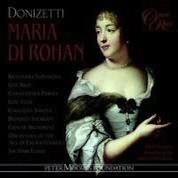Maria di Rohan, one of Donizetti’s last operas, is also one of his leanest. It was composed for Vienna in 1843 for an audience that preferred its story-telling to be direct and relatively unadorned; later that year it was presented in Paris in a revised version, with the minor tenor role of Gondi, a political figure, transposed for mezzo-soprano and enlarged. The entry of this trouser figure does not help the opera dramatically, and this new CD version, unlike the others available, reverts to the original. (The music for the revised role of Gondi, as well as a duet for Maria and Chalais, is included as an appendix to the final CD.)
The opera takes place during the time of Louis XIII with the figure of Cardinal Richelieu looming large, although he never appears. The Countess Maria di Rohan (soprano), lady-in-waiting to Queen Anne, is married to Chevreuse (baritone), an enemy of Richelieu’s, but she is conflicted by the presence of her former lover, Chalais (tenor, a friend of Richelieu’s), who does not know that she’s been married to Chevreuse for more than a year. (Her mother made her marry Chevreuse for political reasons.) There’s plenty of political intrigue as well, and a duel or two. Donizetti claimed to have composed the opera in eight days; it certainly has an economy of style and dramatic thrust that implies intense work.
The revision adds arias and cabalettas–nice to hear, good show pieces–but waters down the plot, which is complex enough and includes a secret letter, a disguise, and general confusion. At the end, Chalais dies and Maria and Chevreuse remain in their loveless marriage–a very odd plotline for a bel canto opera. Watching it, I should imagine, makes more sense than just listening to it, but the music is first-rate Donizetti.
Despite the title role being Maria’s, the most interesting character is the baritone, Chevreuse. On a live recording from La Fenice in 1974 (Opera d’Oro), baritone Renato Bruson sings the role magnificently, with exclamatory moments as potent as lyrical ones. (The same baritone who created Verdi’s Nabucco created Chevreuse.) Here, Christopher Purves seems to have trouble with the upper end of his range, particularly in his angry aria and cabaletta in the last act, when he realizes that he’s being betrayed. Elsewhere, his artistry wins out, but I still had Bruson’s voice in my head when I listened to this new set.
Krassimira Stoyanova is a wonderful Maria, the voice a rich, agile instrument, even throughout its range. Renata Scotto (also on Opera d’Oro) is more interesting but does not sing as well; Edita Gruberova (on Nightingale) gets little opportunity to dazzle in this opera. Stoyanova gets the prize therefore–her singing is always lovely and involved, and her third-act prayer, with its cor anglais intro, is a high point. José Bros, as our tenor hero, Chalais, has a more typical bel canto role but with a bit more muscle; he is better than the competition and sings with style.
Where this release wins the day is with the playing of the Orchestra of the Age of Enlightenment under Mark Elder: he leads as if this were early/mid Verdi (i.e: Ernani), and the instrumentalists play with real fervor. The smaller vocal parts are well taken, and as usual Opera Rara has supplied us with a booklet that is filled with plenty of fascinating information. The Appendix, with the music from the Paris version, makes this a necessity. Although I can’t recommend this release without qualification, it’s better than good. It is fascinating to hear what Donizetti composed right after Linda di Chamounix, an ornate, lengthy, opera semi-seria, and this set will show you.
































